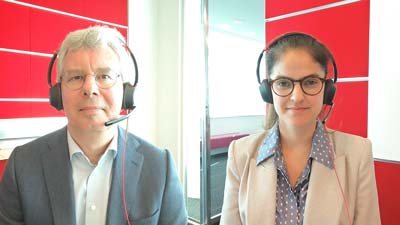James Gard: So, Japan is making headlines again after raising interest rates for the first time in 17 years. Here to discuss the market reaction after this is Sam Perry. He is the Senior Investment Manager at Pictet Asset Management.
Welcome, Sam.
Sam Perry: Thank you.
Gard: So, the yen fell after the announcement and policymakers are talking about supporting the currency. Has this market reaction surprised you?
Perry: In a way, no, because when we had the change to negative interest rate policy back in 2006, everyone expected the yen to weaken and instead it strengthened. I think this is again like 2006 had been so well flagged by the Bank of Japan that there was never going to be that much market reaction. In terms of the weakening, it hasn't moved very much. It's a couple of percent. While at the same time, if you try and look at the fundamental value for the currency, always a tricky job, but that looks more like sort of 120. One of my colleagues at Pictet, he reckons 108. So, will we get to a strengthening position? Probably yes, but we may just have to wait a little bit.
Gard: Sure. That may take time really. But in terms of the inflation makeup and the nature of inflation in Japan, you're a believer that it's sustainable in Japan. How does that back the kind of longer-term investment case for investing in Japan?
Perry: The short answer still needs us to go back into the 80s and the collapse of the bubble and then Japan's desperate need to deleverage. Roll that through, we start seeing deflation come in and they're desperate to get rid of all that leverage again and build up cash because it's going to give them the real return risk-free. This is the simplest thing to do. Get rid of the gearing, have cash. The problem then is that that embeds deflation even further. But that then requires you to hold more cash because it's still giving that real return risk-free. There's no incentive to invest. So, we have this massive pile of cash sitting on corporate balance sheets.
So, what's the point of inflation? The point of inflation and the point of all of the Bank of Japan's efforts since 2012-2013 has been to instil this inflationary attitude to really kind of get that mentality back into corporate Japan because at that point, the cash is a wasting asset. So, once we've got that position, then all of a sudden, corporate boards are looking around thinking, we've got to do something with our cash, we have to invest. So that's really the story for Japan. We're starting a huge, potentially huge investment cycle in Japan as all of this cash is flushed out, is handed back to shareholders, gets spent onto M&A and we can see this happening now starts feeding into investment and capital expenditure.
Gard: Sure. So, we're kind of at the beginning of the cycle in terms of, you know…
Perry: It seems strange. I've been talking about this as a prospect for nearly 10 years ever since yield curve control and qualitative and quantitative easing was enacted by the Bank of Japan. But yeah, I think now we've kind of hit the starting blocks.
Gard: Sure. And just quickly, I mean, do you have any kind of examples of leaders in this field?
Perry: One of the great advantages for Japan in this scenario is that it still has that significant industrial base. So, we're not looking so much at a service economy as compared, let's say, to the U.S. as we are looking at a much more industrial economy. So that CapEx spend is really going to flow through. And you've got the world's leaders in robotics, the world's leaders in factory automation, they're all sitting in Japan, FANUC, which makes the robots or SMC, which makes pneumatic actuators for factory lines, they're all there, and that's where we expect to see the orders start to flow.
Gard: Sure. So, interest in Japan seems to be at a high, but you're saying that there is still a bit of a way to go in terms of inflows. Can you explain why there's a mismatch and what would need to happen to change that?
Perry: Yeah, you're absolutely right. There's clearly a lot of interest. I mean whether it be looking at the pages in the FT or whether it be looking at just the number of meetings that we're – meeting requests we're getting from clients and prospective clients, there is a lot of interest. But you're right, it hasn't translated yet into money flowing into Japan.
There was a brief period of excitement around this time last year when it seemed to be that the flows are picking back up. They were, that's true, but from, number one, a very, very low base and number two, even compared to the flows that we saw 2012-2013 after the start of Abenomics and QQE, it's tiny proportion of that and of course the market is four times bigger. So, the overall impact is minimal.
So how do we explain it? I think that there are a couple of things. The first is that imagine that you are running a global pension fund balanced mandate. Then you've got a portion which is your equity portion. Within that equity portion then, what, 70% is going to be the U.S.?
Where is everyone's focus? It's on the Magnificent Seven, it's on AI, it's on whatever. So how much then do you have left for Japan? Well, it's a pretty small part of the MSCI World these days. I mean if you have an equity mandate, it's even smaller.
So, what do you need to really feel convinced? I think that one of the problems ironically is the success. We have had such a strong market performance over the last, say, 18 months that people are saying it's too late, we can't come in. And yet, at the same time, we can't see foreign money coming in. Whether you look at the assets under management of the ETFs which focus on Japan or look at active managers which focus on Japan, it's still very hard to see signs of anybody really pushing money in. So, then we can also look at the domestic investors. Mr. and Mrs. Watanabe, the sort of every man and every woman on the Japanese street, the Prime Minister, Kishida, wants to get their allocation to equities to double what it is at the moment. And he has enacted a series of reforms to the Nippon ISA which is modelled after our own ISA. And that has worked in order to get money in except that money has then promptly flowed back out again to, yes, the Magnificent Seven and to U.S. trackers and so forth.
So, we've still got, I think, a measure of people looking at Japan and think, it's gone up so much, it can't be there. And yet, the market has gone up four times since 2012, but that's all been earnings growth. There's been no change in valuations. So, there's still a huge amount of upside left. Given the growth that we expect to see is this cash on the corporate balance sheet has flushed out into investment, given that you can get a higher yield in topics, and you can on the S&P, yeah, we think that there's a lot of upside left, particularly as people come to understand this macroeconomic story of how inflation is actually real positive in Japan.
Gard: Right. Yeah. I'm convinced now. But in terms of passive versus active, Japan has always been a very fertile ground for active investors. Can you make the case for active investing over passive investing, especially with markets' highs?
Perry: Yeah. So, I mean, there are a couple of points. A lot of people look towards the big ETFs as a simple way to invest. The problem is that the big ETFs largely domiciled in the U.S. Then they're operating out of ours of the Tokyo market. Now that comes with a cost. If you're going to provide that liquidity, that comes with the cost. So, yes, the actual fee is very low. But your performance, your returns are going to get hit because of the extra cost to providing the liquidity. So, you got to bear that in mind.
Trackers, I would say, is probably a better option for a European or a U.S. investor. Use trackers rather than ETFs. Less convenient for you perhaps, but at least you're not paying that liquidity cost. However, you're still guaranteed a slight negative return every time So, yes, I mean, I suppose I got us taught my own book. Yeah, I got to say you should go active. And I think that's where you can get the real returns and there are still – Japan is a terrifically deep market. It's very, very liquid, very deep and there's still lots of opportunities there.
Gard: Brilliant. Okay. I'm still excited about Japan. So, hopefully, the market returns continue to impress. So, thanks for your time, Sam. For Morningstar, I'm James Gard.





























